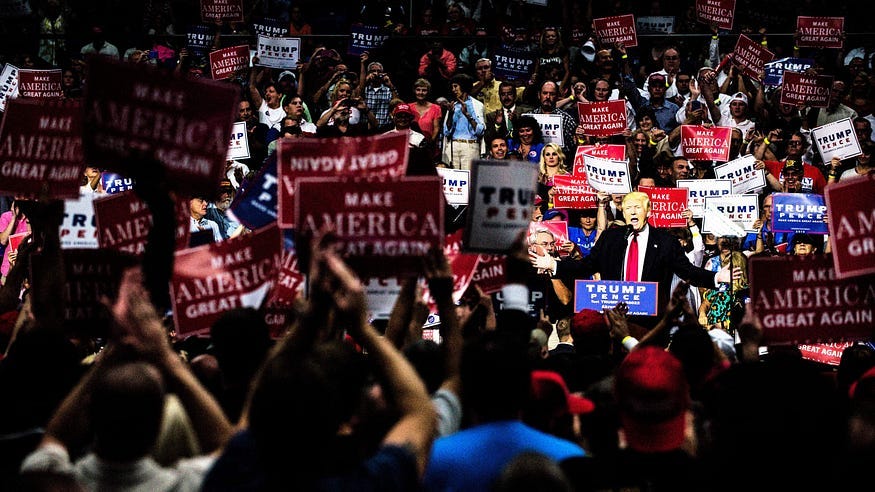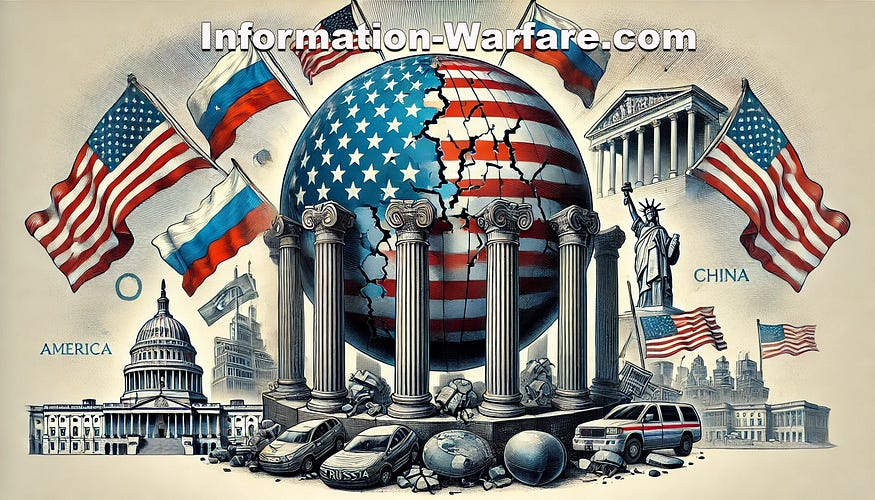Putin’s Blueprint to Win the Information War
Alter America’s Global Standing
The Role of an Agent of Influence
Vladimir Putin’s strategy to weaken America’s global standing involves deploying an agent of influence within the U.S. This covert operative subtly advances Russia’s interests, fostering distrust and division from within.
1. Undermine Trust in Institutions
Disinformation Campaigns: Flood social media with false narratives to erode trust in the media, judiciary, and democratic processes.
Support Populist Movements: Back political figures who question the legitimacy of democratic institutions.
2. Exploit Social Divisions
Amplify Polarization: Use targeted ads and fake news to deepen racial, economic, and ideological divides.
Promote Extremism: Encourage fringe groups and conspiracy theories to destabilize societal cohesion.
3. Weaken International Alliances
Criticize NATO: Promote skepticism about NATO’s relevance and effectiveness.
Isolate the U.S.: Foster relationships with countries adversarial to U.S. interests, like China and Iran.
4. Cyber Warfare
Hack and Leak: Conduct cyber attacks to steal sensitive information and leak it to embarrass U.S. officials and disrupt political processes.
Undermine Elections: Interfere in electoral processes to question the legitimacy of election outcomes.
5. Promote Alternative Narratives
Propaganda Outlets: Use state-controlled media like RT and Sputnik to spread pro-Russian and anti-American narratives globally.
Influence Campaigns: Sponsor think tanks and academics to subtly push pro-Russian viewpoints in Western discourse.
6. Economic and Diplomatic Leverage
Energy Dominance: Use control over energy supplies to influence European policies.
Strategic Alliances: Form and strengthen alliances with other authoritarian regimes to create a bloc against Western influence.
The Role of an Agent of Influence
An agent of influence operates subtly within the target country, leveraging their position to further the agenda without arousing suspicion. This agent could be a high-profile political figure, a media personality, or a prominent academic. Their actions would include:
Advocating Policies Favorable to Russia: Publicly supporting policies that align with Russian interests.
Spreading Disinformation: Utilizing their platform to disseminate Russian propaganda and false narratives.
Sowing Discord: Exploiting social and political divisions to weaken national unity.
Influencing Public Opinion: Shaping public discourse to cast doubt on democratic institutions and processes.
Conclusion
By systematically undermining trust in American institutions, exploiting social divisions, weakening international alliances, and employing cyber and propaganda tactics, Putin aims to reduce America’s influence and enhance Russia’s standing on the world stage. The deployment of an agent of influence is a key component of this strategy, subtly advancing these objectives from within the United States.
In the context of an information war, the Make America Great Again (MAGA) movement can be seen as a significant player in the domestic battle for narrative control. If information warfare is defined by the spread of propaganda, disinformation, and the manipulation of public opinion, MAGA represents a faction deeply engaged in this struggle. Supporters and influencers within the movement often use social media, alternative news sources, and public rallies to disseminate their messages, sometimes promoting divisive or misleading content that can influence and polarize the American public. This dynamic highlights the broader conflict over truth and influence within the United States.
The Playbook Trump and MAGA Follow in the Information War
Strategies Employed:
Disinformation and Misinformation:
Social Media Use: Leveraging platforms like Twitter, Facebook, and Parler to spread messages rapidly.
Alternative News Sources: Promoting stories through outlets that align with their views, often bypassing mainstream media scrutiny.
Creating Echo Chambers:
Community Building: Fostering loyal groups online and offline that reinforce shared beliefs.
Selective Information Sharing: Emphasizing information that supports their narratives while dismissing contradictory evidence.
Delegitimizing Opponents:
Attacks on Media: Labeling mainstream media as “fake news” to undermine public trust.
Discrediting Institutions: Casting doubt on the integrity of elections, the judiciary, and other democratic institutions.
Emotional and Identity Appeals:
Populist Messaging: Framing their movement as a fight against an elite establishment.
Cultural Warfare: Emphasizing themes that resonate with their base’s values and fears.
Role in the Information War:
Influencers and Amplifiers: Trump and MAGA act as both the originators and amplifiers of narratives, using their significant platforms to shape public discourse.
Disruptors: They disrupt traditional media cycles and force mainstream outlets to cover their messages, even if critically.
Success Factors:
Broad Reach: Effective use of social media ensures widespread message dissemination.
Loyal Base: A dedicated and active supporter base that engages with and spreads their content.
Narrative Control: Ability to set and control the topics of national discussion, often putting opponents on the defensive.
Impact:
Polarization: Their tactics contribute significantly to the increasing political and social polarization in the United States.
Distrust in Institutions: Success in sowing doubt about the integrity of democratic processes and institutions.
Resilience: Despite numerous controversies, the movement remains resilient and influential.
Trump and MAGA’s playbook in the information war involves strategic use of disinformation, creating echo chambers, delegitimizing opponents, and leveraging emotional appeals. Their role as influencers and disruptors has been successful in shaping public discourse, contributing to political polarization, and undermining trust in institutions. The movement’s ability to maintain a loyal base and control narratives has proven to be a formidable force in the ongoing information war.
On the Side of American Interests or Russian Interests?
The alignment of Trump and the MAGA movement’s actions in the context of the information war raises complex questions about their ultimate impact on American versus Russian interests.
Here are some key considerations:
Actions and Impacts
Undermining Trust in Institutions:
American Interest: Weakening trust in democratic institutions can harm the integrity and stability of the U.S. political system.
Russian Interest: Destabilizing U.S. institutions aligns with Russia’s strategic goal of weakening American global influence.
Creating Polarization:
American Interest: Increased polarization undermines national unity and hampers effective governance.
Russian Interest: Amplifying divisions within the U.S. supports Russia’s objective of creating internal discord.
Foreign Policy Decisions:
Questioning NATO:
American Interest: Weakening NATO undermines the U.S.’s primary military alliance.
Russian Interest: A weakened NATO is advantageous to Russia, reducing the collective security threat to its borders.
Conclusion
While Trump and MAGA’s actions might be framed as serving American interests by advocating for “America First” policies, their broader impact often aligns more closely with Russian strategic goals. By undermining trust in institutions, increasing polarization, and questioning key alliances, their actions can inadvertently or intentionally advance Russian interests at the expense of American stability and global standing.



